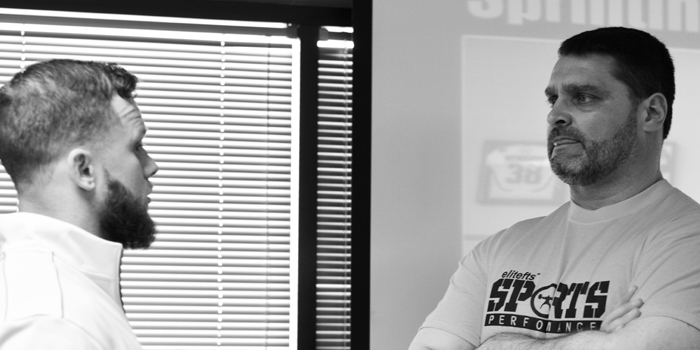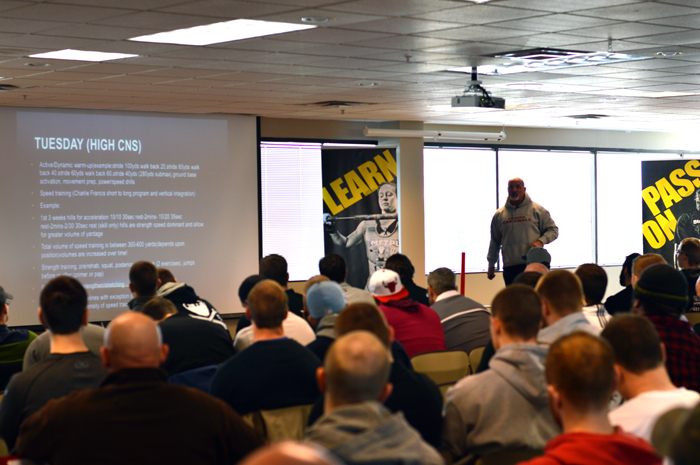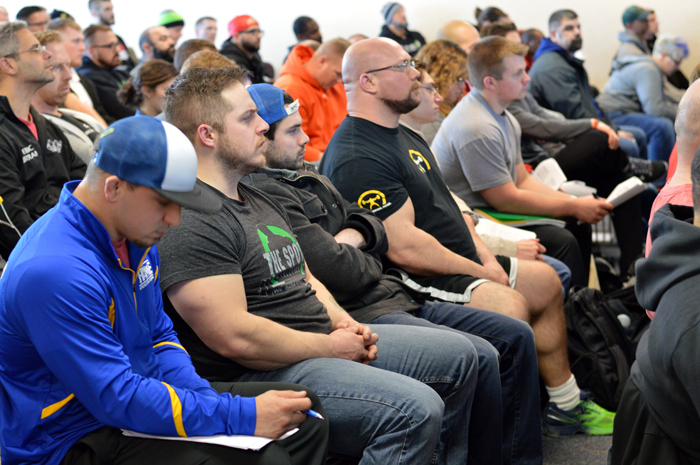
I had the pleasure of spending my Saturday at the elitefts Sports Performance Training Summit. It was the first event of its kind from elitefts and it was a huge success. The line up of speakers was second to none.
The first thing I took away while watching Buddy Morris present was to lead with who has led you; start off with your acknowledgements and appreciation. So I’d like to say thank you to all of my mentors who have shaped me into being the coach I am. I have had the pleasure of working with a lot of amazing family members, other coaches, and athletes and interns. Thank you, to all of you. This field has been amazing to me, and it’s due to a large number of people who were at the summit Saturday.
Now on with the article.
Being an amazing coach is the most important thing in our industry. While science and programming and all that other fancy stuff is important, it doesn’t make you a good coach. Your two degrees and five certifications don’t impress me. Can you coach? Do you care about your athletes? Do you have a passion for helping people? Those things will impress me. A great coach with a mediocre program will produce great results. You are a leader as a coach. You have anywhere from 1-100 athletes looking to you for direction. That is a big task to take on. You have the opportunity to shape hundreds of thousands of lives, just by being a coach.

What does being a great coach entail, though? Being an amazing coach? What’s that?
To excel as a leader and a coach you must be a good teacher. As a coach and a leader you are the most important person on the team. Your greatest teaching tool is your own example. Focus on being the best example that you can possibly be. Everyday. Get better as a coach. Don’t settle for mediocrity just as you wouldn’t allow your athletes.
As coaches we are hard on our athletes, but the one you need to be the hardest on is yourself. You need to push yourself harder than you push your athletes. If you want to produce the best athletes, you need to be the best coach. Always work to improve, knowing that you can never improve enough. Be the kind of coach that you would want to play for. You have a duty as a coach to give your athletes everything you have. Your relationship with your athletes is like any other relationship; you have to be fully committed to your athletes, just as you do a spouse. If you’re not 100% committed, then the relationship will fail.
Coaching is an art. You won’t learn it in your undergrad or in your masters program. You want to be a strength coach; you go to school to be a strength coach yet in your program you never learn how to coach. Now we hope that an internship or a GA position will help us learn this fine art but most of the time that is not the case. Coaching is about people. You’re passion needs to be helping people in order to make it in this industry. A passion for getting the opportunity to coach, mentor, teach, lead and shape young athletes. What they learn from you will shape them for a lifetime.

Think about that for a minute. Think back to when you were younger and you were playing sports. What coaches impacted you both positively and negatively? The lessons you learned from them, you still carry with you today. You need to care about people. You need to care about your athletes.
Be personal with your athletes. This will dictate whether your players will relate to you. You need to be a good communicator. Different athletes require different means of communication. You need to be able to convey your ideas and instructions to your players using various methods of teaching. You can’t just present these ideas; you have to teach them. You need to understand that everybody learns a little differently. It is your job as a coach to find different ways to teach your athletes. But remember that your athletes aren’t the only ones that need to listen. If you don’t listen to your athletes, why should they listen to you? All athletes have various training ages and learn things very differently and at different rates. Don’t snap at your players for not understanding something. It is your job to find out how they will understand.
Control your emotions. If you don’t, your emotions will control you. You can’t think clearly if you’re an emotional leader. Never, ever lose patience. We have all had those athletes that have pushed us to our limits. And I’m sure some of you have lost your patience, but resist the urge to let go. If you become impatient with your athletes, don’t be surprised when they shut down and cannot concentrate. Losing your patience with your athletes will lead to your athletes losing respect for you. You need a level of mutual respect for those that you coach. They are working with you, not for you. If you don’t display genuine care and concern for all your athletes then you are failing them as a coach.

Sometimes you may be the only person your athlete has to turn to. Your athletes always come first. If you have an open-door policy, make sure your athlete feels like there is an actual open door. The athlete should feel that you are always available and that anything they come to you with, they can trust you. Take active interest in your athletes. Listen to them. Treat your athletes like they are family, like they are your brothers and sisters, sons and daughters. You’re a role model to these kids. They will learn a lot from how you interact and behave. Treat them like family.
As a couch you are a motivator, a role model, a friend, a disciplinarian, a mentor, and a teacher. This is something they probably didn’t tell you in college.
You need to love what you do. Your heart must be in it 100%. Your passion, energy and love for coaching must always be present. That’s the only way you’ll be a good coach.
Nic Bronkall is the Director of Athletic Development and the Internship Director at The Spot Athletics in Columbus, Ohio. He is also an avid powerlifter competing in the 242 weight class.








